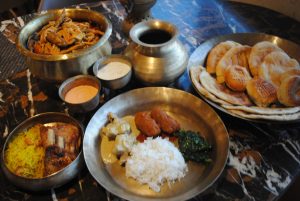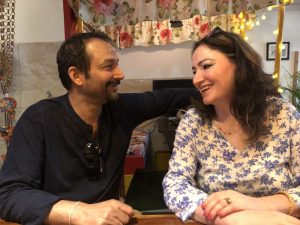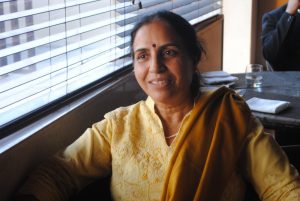For the last three decades or so, Delhi has been exposed to the glories of Kashmiri food. Or, to be more specific, wazwan. It is a  banquet conjured up entirely of lamb and it is cooked by a community of caterers called wazas. Usually eaten at weddings and other celebratory occasions, it consists of gargantuan quantities of food – at least seven courses. In the last two or three years, food aficionados in the city have started to hear of the other side of the story: the Kashmiri Pandit cuisine, lesser known, perhaps because the community is smaller. However, as many of them have settled down all over the National Capital Region, dishes such as matsch, kaliya and dum oluv are beginning to get their place in the sun.
banquet conjured up entirely of lamb and it is cooked by a community of caterers called wazas. Usually eaten at weddings and other celebratory occasions, it consists of gargantuan quantities of food – at least seven courses. In the last two or three years, food aficionados in the city have started to hear of the other side of the story: the Kashmiri Pandit cuisine, lesser known, perhaps because the community is smaller. However, as many of them have settled down all over the National Capital Region, dishes such as matsch, kaliya and dum oluv are beginning to get their place in the sun.
The most interesting aspect is that though there are Kashmiri Pandit caterers, it is the home-cooked food of the community is what has become popular of late. So, it  is a toss-up between the restaurants and take-aways that are waza dominated and the Pandit-centric eateries and catering services all of which have ladies at their centre. Thus, when Matamaal opened a few years ago, everyone sat up and took notice, because Matamaal means grandma’s house (mother’s mother). And although Nalini Moti Sadhu is absurdly young and glamorous to be a grandmother, the customers that flock to her restaurant-cum-bakery-cum-provision store feel as if they’re being pampered by their own grandma.
is a toss-up between the restaurants and take-aways that are waza dominated and the Pandit-centric eateries and catering services all of which have ladies at their centre. Thus, when Matamaal opened a few years ago, everyone sat up and took notice, because Matamaal means grandma’s house (mother’s mother). And although Nalini Moti Sadhu is absurdly young and glamorous to be a grandmother, the customers that flock to her restaurant-cum-bakery-cum-provision store feel as if they’re being pampered by their own grandma.
Such a runaway hit was Matamaal that it has just undergone its third expansion, taking over the neighbours’ space as well. You might find Nalini putting out jars of pickles in the sun outside her front door, or arranging her lovely display cabinet with its brass tableware that is for sale, along with Kashmiri spices and other ingredients. The menu is small and the couple – Surender Sadhu has been co-opted into the business – run it like an extension of their home. The thalis do very well here.
 In Kalkaji, Aanchal Pandita has named her home delivery service Safapore, after the small town on the banks of the superbly picturesque Manasbal Lake. Safapore is where her grandfather hailed from and though Aanchal has never actually seen the somnolent town, the very name had so much of a cachet for her that it has become her trade name. The small menu that comprises of Tchok Wangun (aubergine soured with tamarind) and mutton kaliya in its trademark milk gravy, stained yellow with turmeric, and has to be ordered a day before: nothing is sitting around half-cooked, waiting to be finished à la minute. This is not only a hallmark of Safapore but also of Matamaal. It is probably the hallmark of all the lovely ladies from Kashmir who wield the ladle: home-cooked food is famously fresh, healthy and tasty. And that is what Rajni Jinsi brings to her hotel festivals: planned menus with a sprinkling of popular preparations, plus a few home-style dishes or foods eaten at festivals or fast-days. Her Khetchar with
In Kalkaji, Aanchal Pandita has named her home delivery service Safapore, after the small town on the banks of the superbly picturesque Manasbal Lake. Safapore is where her grandfather hailed from and though Aanchal has never actually seen the somnolent town, the very name had so much of a cachet for her that it has become her trade name. The small menu that comprises of Tchok Wangun (aubergine soured with tamarind) and mutton kaliya in its trademark milk gravy, stained yellow with turmeric, and has to be ordered a day before: nothing is sitting around half-cooked, waiting to be finished à la minute. This is not only a hallmark of Safapore but also of Matamaal. It is probably the hallmark of all the lovely ladies from Kashmir who wield the ladle: home-cooked food is famously fresh, healthy and tasty. And that is what Rajni Jinsi brings to her hotel festivals: planned menus with a sprinkling of popular preparations, plus a few home-style dishes or foods eaten at festivals or fast-days. Her Khetchar with  Lamb’s Liver soured with tamarind or Modur Polao with Kabargah (sweet rice with fried ribs) are never seen outside private houses, but homesick members of the community cannot get enough of Rajni’s home-style cooking. At her festivals – held in several Delhi hotels and Kolkata and Bikaner resorts – she brings along her own brass utensils, many of them over 50 years old, to add verisimilitude to the food. Her food embodies the elemental flavours of Kashmir’s ingredients, cooked with precision and with the unmistakable buzz of asafoetida, the one defining spice of this tiny community who chooses the background rather than the limelight.
Lamb’s Liver soured with tamarind or Modur Polao with Kabargah (sweet rice with fried ribs) are never seen outside private houses, but homesick members of the community cannot get enough of Rajni’s home-style cooking. At her festivals – held in several Delhi hotels and Kolkata and Bikaner resorts – she brings along her own brass utensils, many of them over 50 years old, to add verisimilitude to the food. Her food embodies the elemental flavours of Kashmir’s ingredients, cooked with precision and with the unmistakable buzz of asafoetida, the one defining spice of this tiny community who chooses the background rather than the limelight.
It is a heartening sign that ITC Hotels has appointed a Corporate Kashmiri Chef, who is not only from the Pandit community, but who is also female. You can enjoy Chef Suman Kaul’s trademark Apple Pakoras and Fish with Lotus Stem Gravy every Wednesday at lunch in ITC Maurya.








